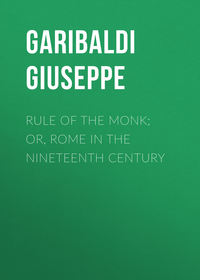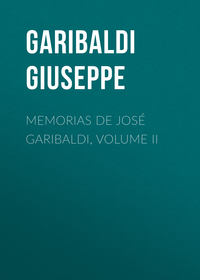 полная версия
полная версияThe Life of General Garibaldi
"Garibaldi, full of wonder, went about trying to imagine and divine what magical hand could have made so great a change. He even almost began to doubt whether it was the Island of Caprera. Entering the house, and looking about in every part, he found in the centre a rich and commodious hall, and, supported from the wall, a large and beautiful portrait. It was one of Victor Emanuel!"
The following is from a letter of the Rev. J. Newman, dated "Naples, November, 1860:"
AN INTERVIEW WITH GARIBALDIIt was my good fortune to have an interview with General Garibaldi, in the royal palace at Caserta, a day or two before his departure. When I arrived at the palace, the dictator was in the king's garden, sitting for his photograph – a pretty Italian lady acting as artist. General Turr, and the other officers of his staff, were present; also the wife of the mayor of Palermo, and two other ladies. As in ordinary cases, the artist had great difficulty in arranging the general's head and hands, but still more in getting him to keep them arranged, according to order. And after the picture was finished, he was the first to look at it, which he jocosely pronounced good. He then walked with one of his staff, and again with the mayor's wife, through the broad avenues of the garden, and finally strolled off alone, with his arms thrown behind and his head inclined forward, like one in deep reflection.
He kindly received me into his private apartments in the palace, where, by a most winning manner, he made me feel myself quite at home. Learning that I was an American, and having himself travelled through North and South America, the conversation turned upon the United States. He indicated his comprehensive and penetrating mind by a marvellous familiarity with our history and prosperity. Nothing can exceed the grace and dignity with which he conversed. He was mild in his manner till I suggested the great want of railroads in Italy, when he immediately grew animated, and drew a striking contrast between Italy and America, as to material greatness, and concluded with expressions of hope that a brighter day is dawning upon his native land. Garibaldi is so justly proud of his American antecedents, that it is not egotism for me to claim for our country an important agency in the Italian Revolution, by the impressions our institutions and greatness made upon his mind while there. My previous admiration for the man was increased by this brief interview. He seemed to me to be a man of exalted purpose and of generous sympathies. He is now in the prime of life, and in the enjoyment of robust health, which he preserves by his simple mode of living. He is above the medium height, and has a powerful muscular frame. His complexion is florid; his hair and beard sandy; his brow lofty, and his eyes are of a light chestnut hue, and when at ease they have that dreamy expression so peculiar to many great men. He is not particularly dignified in his address; his gait is even careless; his carriage might be thought uncourtly, yet there is that indefinable something in his presence which, while it does not overawe you, yet impresses you with a profound respect for the man. He is certainly an extraordinary character, and the most popular man now before the world. He is honest in his principles, unselfish in his purposes, unalterable in his decisions, lasting in his friendships, bitter in his enmities, and magnanimous to all. When I saw him he was attired in grey pants, a red shirt, and a grey mantelet, lined with a red and black plaid, the sides of which were looped upon his shoulders, giving free play to his arms. He wore a Chinese cap, common in England, and a serviceable sword was dangling at his side, which constituted his uniform. His mode of living is extremely simple, so much so that his staff joke him by saying they do not expect to get much to eat where he is. He never takes wine, and generally breakfasts upon a cup of coffee and a few Italian chestnuts. He had formed the decision to retire to his island home. If you will turn to your map, you will see a little island on the northern coast of Sardinia, near the entrance of the Straits of Bonifaccio, and opposite to the southern point of Corsica. This is Caprera, where the famous Garibaldi, with his son and daughter, together with a few choice friends, is now residing. The island is less than six miles in length and not two in breadth. It consists of two rocks, which belonged to an Englishman and the general. The former is now dead, and Garibaldi is left alone in his rockland glory. But on reaching his island, he was most agreeably surprised; the appearance of his home had been so changed since he left. Well cultivated fields and beautiful plantations, with shady groves and spacious avenues, had taken the place of a stony desert. It looked as if a magician had been there, and struck the island with his wand, bidding nature forthwith to lavish her treasures on this chosen spot. But the general was still more surprised when, instead of his humble cottage, an elegant villa stood before him; but on entering it the mystery was solved, for on the wall hung the portrait of his friend Victor Emanuel, whose generosity had anticipated his happiness.
The following extract of an unpublished letter from a gentleman in Piedmont to a friend in New York, contains a most particular description of Garibaldi's arrival at Caprera:
"Turin, Nov. 24, 1860."What do you say of all that has been passing here, and of Garibaldi, the king-maker? You will have heard that this true patriot refused the rank of first marshal of the kingdom of Italy, which would have made him the first person after the king; and the order of Annunziale, which is equal to that of the Golden Fleece, and generally only given to born princes.
"Garibaldi lives near the Island of Sardinia, on the small Isle of Caprera, right in front of the Pass of Bonafaccio. It is a mere rock, uninhabited or nearly so, where he has a small house and a little garden, where he lives with his daughter, spending his time fishing. To this hermitage he has retired, after having made a present to Victor Emanuel of the kingdom of Naples. But you may fancy his surprise, when, on arrival, he found his little garden had given room for a park, with large trees, more than a century old, with flower-beds, etc., etc. He entered his house. The outer walls were as he left them; but the interior had become a palace, with magnificent furniture and velvet hangings, with gold fringes, etc. He passed into the study, and there above the massive mahogany table, hanging against the wall, upon the velvet tapestry, a large painting, made by one of the first artists of the day, in which he could not but recognize himself, sitting at a table, his head bent over a drawing of a plan of battle he was forming, while the king standing next him, his right arm leaning familiarly on his shoulder, was looking, in a bending position, at what he was doing.
"Was this not a pretty surprise which the king prepared for his faithful follower, the fisherman's son, who had given him a kingdom and would accept nothing – neither rank, nor honors – in return?"
THE END1
(TRANSLATION.)Staten Island, 30th October, 1850."Dear Mr. Theodore Dwight:
"According to what I have promised you, I send you the first biographical sketch; and do not be surprised that it is that of my wife. She was my constant companion, in good and bad fortune – sharing, as you will see, my greatest dangers, and surpassing the bravest men. I wish you to consult Foresti, respecting the manuscripts and translations, and frankly express to me your opinion.
"Yours,
G. Garibaldi."2
"Ganado" means herds of cattle, and "Cavaladas" herds of horses, which animals abound in those regions, living in the rich pastures. The cattle afford the only food for soldiers, and the horses are indispensable for cavalry – the best troops in South America.
3
This theatre is one of the most splendid in Europe, and has five galleries, all entirely covered with gilding.



